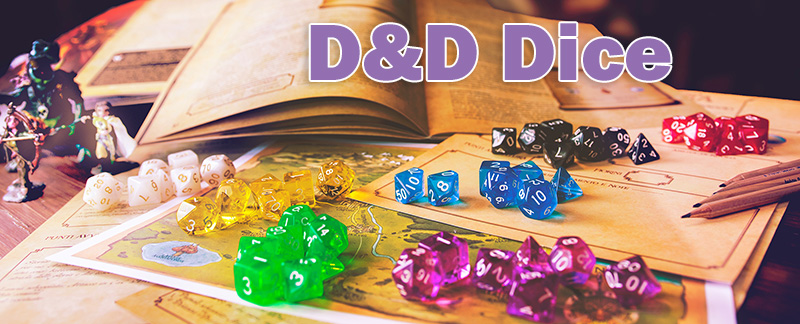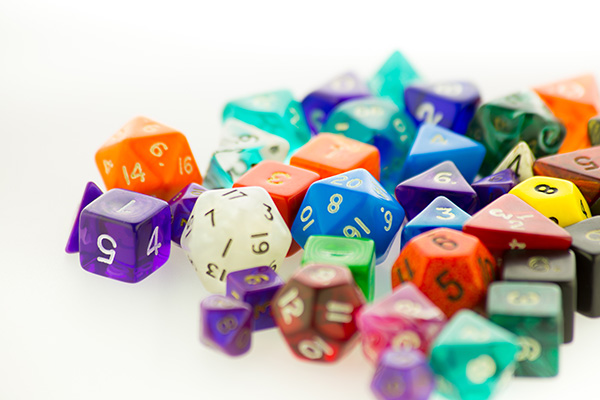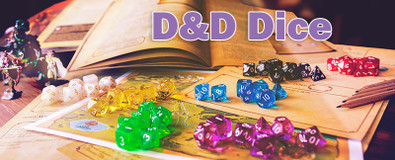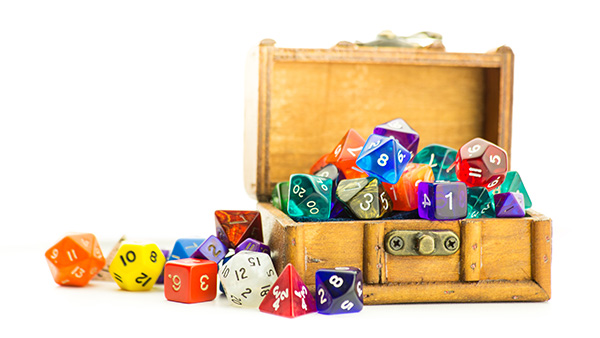DnD Dice: Your Essential Guide to Dungeons and Dragons Dice Sets

Are you new to the world of Dungeons and Dragons (DnD) or role-playing games? Are you eager to dive into fantastical realms and experience thrilling adventures? Well, if you are, then let's talk about something essential: dice. In DnD and similar games, these little polyhedral wonders aren't just tools; they're like magical artifacts that can shape the outcome of your quests and battles. As you'll discover the more you play DnD, having the right dice can really amp up your enjoyment of the game. That's why we're here with this handy guide to DnD dice sets. We'll walk you through all the basics, from what kinds of dice you'll need to how they work in the game.
Understanding the Different Types of DnD Dice
DnD, or Dungeons and Dragons, is a popular tabletop role-playing game that has captivated the hearts of gamers for decades. One of the defining features of DnD is the use of dice to determine the outcomes of various actions and events within the game. Understanding the different types of DnD dice is essential for any player or Dungeon Master (DM).
There are seven different types of dice used in DnD and these are commonly referred to collectively as a DnD dice set. These sets include a variety of dice with different numbers of sides. The most recognizable among these is the 20 sided dice, also known as a d20. This dice is used for determining the success or failure of most actions, such as attacking or making skill checks.
But let's start our examination of the DnD dice set by looking at the 4-sided die, or d4. This die, also known as a tetrahedron, is unique in its shape. It has four equilateral triangular faces and a pointed vertex. The d4 is commonly used for determining small amounts of damage or for specialized actions in the game.
Next up is the most recognizable shape in the set: The 6-sided die, or d6. It's the die that we're all most familiar with since it's commonly used in many board games and even gambling, but the d6s used in role-playing games typically have a number on each face instead of the traditional spots. In Dungeons and Dragons (DnD), the d6 is used for a variety of purposes, the main one being stat generation during character creation. It is also used for rolls involving sneak attacks, damage from certain weapons, and for many spells.
Then we have the 8-sided die, or d8. This die is often used to determine the amount of damage dealt by weapons or spells, as well as for randomizing certain events or outcomes during gameplay. The d8 is one of the less commonly used dice in DnD, but it still has its purposes in some situations such as when rolling for damage with larger weapons.
Next is the 10-sided die, or d10. This die is commonly used to determine damage rolls, as well as for making percentile rolls. A percentile roll involves rolling two d10s, where one represents the tens digit and the other represents the ones digit, resulting in a range from 1 to 100. Percentile rolls are often used for determining success rates or determining random outcomes with a degree of precision.
Moving on to another of the rarely used and specialized dice, we have the 12-sided die, or d12. This die is often reserved for specific abilities or weapons, such as the damage dealt by a powerful warhammer.
Finally, we have the 20-sided die, or d20. This is perhaps the most iconic of all the dice in DnD, as it is used for determining the success or failure of skill checks, saving throws, and attack rolls. Rolling a natural 20 on a d20 is considered a critical success, while rolling a natural 1 is a critical failure.
Overall, understanding the different types of DnD dice is crucial for playing the game effectively. From rolling the 20-sided dice to see if your character lands a critical hit to rolling the 8-sided dice to determine the damage dealt, each dice serves a specific purpose in creating a dynamic and immersive gaming experience.
The Role of Dice in Dungeons and Dragons Gameplay
In the world of Dungeons and Dragons, dice play a pivotal role in shaping the story and determining the fate of the characters. DnD utilizes a variety of dice to bring this iconic role-playing game to life. These polyhedral dice are the tools through which players and Dungeon Masters navigate the adventures, make crucial decisions, and resolve conflicts.
At its core, DnD gameplay revolves around the rolling of polyhedral dice to determine the outcomes of actions, skill checks, combat encounters, and spellcasting, and the d20 serves as the foundation for most rolls in the game. When a player attempts an action that requires an element of chance or skill, such as attacking an enemy, picking a lock, or persuading a non-player character (NPC), they roll a d20 and add any relevant modifiers from their character sheet. The result is then compared to a target number, known as the Difficulty Class (DC), to determine success or failure.
One of the most critical types of rolls in DnD is the attack roll. When a character engages in combat, they roll a d20 to see if their attack hits the target. This roll is modified by the character's proficiency bonus and relevant ability score bonuses, such as from Strength or Dexterity. If the result meets or exceeds the target's Armor Class (AC), the attack is successful, and the player then rolls additional dice to determine the damage inflicted. Damage rolls use different types of dice depending on the weapon or spell being used, adding another layer of excitement and variability to combat.
Another essential roll is the saving throw, which occurs when a character needs to resist a harmful effect such as a spell or trap. Saving throws are also made using the d20 dice, with modifiers based on the character's abilities, such as Constitution, Dexterity, or Wisdom. The outcome of a saving throw can mean the difference between avoiding a devastating blow or succumbing to a dangerous effect.
Skill checks are another integral part of DnD gameplay. These rolls determine how well a character performs tasks outside of combat, such as sneaking past a guard, deciphering ancient runes, or crafting an item. Just like attack rolls and saving throws, skill checks use the d20 and are influenced by the character's skills and abilities.
As you can see, dice are the lifeblood of Dungeons and Dragons gameplay. They introduce an element of unpredictability and chance that keeps the game dynamic and engaging.
How to Choose the Right DnD Dice Set and Quantity of Dice for Your Character
So as you now know, when it comes to playing Dungeons and Dragons, one of the most essential items you'll need is a set of dice. But with so many different types and variations available, it can be overwhelming to choose the right one for your character. But don't worry, we're here to guide you through the process of selecting the perfect DnD dice set that suits both your needs and the needs of your character.
First, since each of the dice in a DnD dice set serves a specific purpose in the game, you'll obviously want to ensure you have a set that includes all seven of them. But you don't have to just stop there! You might also consider buying extra dice to add to your collection. Depending on your character class, specilizations, known spells, and abilities, you may end up needing to roll more than one of a particular type of dice at a time.
In general, you'll find that three or four sets of DnD dice will give you enough dice to cover most situations. That will give you two d20’s for advantage/disadvantage rolls, at least three d6s to roll for abilities during character generation, and extra dice of the other types that you can use for rolling damage or hit points.
If you'd prefer, you could also buy additional dice individually. Keeping some extra d6s, d4s, and d20s in your collection is always a good idea. And having more dice available to roll during gameplay helps speed things up and keep the game flowing.
Next, when choosing the type of DnD dice to purchase, consider the theme or aesthetic of your character. For instance, if your character is a spellcaster, you might opt for a set with beautifully crafted, magical-looking dice. On the other hand, a set featuring rugged, metallic dice might be more suitable for a warrior character. Aligning your dice set with your character's theme can absolutely make your game more fun and more visually pleasing.
Lastly, don't forget to take your personal preferences into account. Some players prefer larger, more easily readable dice, while others enjoy the challenge of smaller, intricate designs. Additionally, the material of the dice can vary, ranging from plastic to metal or even gemstone. Consider factors such as weight, texture, and overall feel when selecting your set, as these elements can impact your enjoyment of the game.
We carry a wide selection of DnD dice sets, so you're sure to find the perfect set for you.
Materials and Designs: Discover the Diversity of DnD Dice
When it comes to DnD dice, the variety of materials and designs available can be truly staggering. These differences not only affect the aesthetics of the dice but also their weight, feel, and even the way they roll. Understanding the various options can help you choose the perfect set of DnD dice to enhance your gaming experience.
Materials: DnD dice sets are crafted from a wide range of materials, each offering its own unique qualities. The most common material is plastic, known for its durability, affordability, and vast array of color options. Plastic dice are great for everyday gaming, providing consistent rolls and a lightweight feel.
For those seeking something a bit more substantial, metal dice are a popular choice. Made from alloys like zinc or aluminum, metal dice have a satisfying heft and a sleek, polished look. However, their weight can sometimes be a double-edged sword. They're heavier in the hand and they can potentially cause damage to delicate surfaces when rolled, so a dice tray is recommended.
Resin is another material that has gained popularity in recent years. Resin dice can be incredibly intricate, often featuring embedded elements like glitter, miniature figures, or even dried flowers.
Stone and gemstone dice, carved from materials like jade, amethyst, or quartz, offer a luxurious feel and a beautiful, natural appearance. While stunning, these dice are often more delicate and can chip or crack if not handled with care.
Designs: The design of DnD dice goes far beyond simple colors and patterns. Many sets feature elaborate themes that reflect the fantasy world of Dungeons and Dragons. You can find dice with dragons, skulls, runes, and other fantastical elements etched or painted onto them. Some dice sets are designed to look like ancient relics, with weathered textures and antique finishes, perfect for adding a touch of history and mystery to your game.
Glow-in-the-dark and UV-reactive dice are also popular, providing a magical glow that can make nighttime gaming sessions even more immersive. Transparent and semi-transparent dice, often filled with glitter or other decorative elements, add a touch of sparkle and wonder to your rolls. And some dice sets are designed with oversized or undersized numbers to suit players with specific visual needs, ensuring everyone can enjoy the game.
Rolling with the Best: Top Dice Brands
When it comes to dice for Dungeons and Dragons and other tabletop games, several brands have earned popularity and trust among gamers for their quality craftsmanship and diverse offerings.
Chessex: One of the most well-known and widely used dice brands in the tabletop gaming community. Chessex offers a vast array of dice sets in various colors, designs, and materials, catering to the preferences of every player. From classic opaque dice to translucent and speckled designs, Chessex provides options for both casual and serious gamers alike. Their dice are known for their durability and consistency, making them a favorite among Dungeons and Dragons enthusiasts.
WizDice: WizDice is another popular brand that has gained a loyal following among gamers. They are known for their affordable bulk dice sets, which provide players with a wide selection of dice at a reasonable price. WizDice sets often include multiple complete sets of polyhedral dice, making them ideal for new players or those looking to expand their collection. Despite their affordability, WizDice maintains a level of quality that meets the needs of most gamers.
Easy Roller Dice Company: Easy Roller Dice Company is a trusted name in the world of tabletop gaming, known for its high-quality products and dedication to customer satisfaction. They offer a wide range of DnD dice sets, including classic polyhedral dice sets, specialty dice, and premium metal dice. Easy Roller Dice sets are designed with both style and functionality in mind, featuring vibrant colors, intricate designs, and durable materials.
Koplow Games: Koplow Games is a renowned name in the tabletop gaming community, recognized for its extensive selection of dice and gaming accessories.
These are just a few examples of popular dice brands that cater to the diverse needs and preferences of tabletop gamers. From classic and reliable dice sets to unique and artisanal designs, there's a brand out there that can provide the type of dice that are perfect for you.
Dice Accessories: Level Up Your Gaming Gear
When you're into tabletop gaming, having the right dice is just the start. To really step up your game, you need some cool dice accessories like dice trays, bags, towers, and storage solutions. These not only keep things organized and protected but also add a bit of flair to your gaming setup.
Dice Trays: Dice trays are super handy and look great too. They keep your dice from rolling all over the place and protect your table. Usually made of leather, faux leather, wood, or cardboard, dice trays give you a designated spot to roll your dice, making everything neater and less clattery. They also provide a flat obstacle-free surface on which your dice can roll unrestricted.
Dice Bags: Available in all sorts of sizes, materials, and designs—from simple cloth pouches to fancy embroidered ones—dice bags make it easy to carry your DnD dice around and let you show off your style. Whether you like sleek leather, soft cloth, or colorful themed bags, there's something out there for everyone.
Dice Towers: Want to make your dice rolls more exciting and fair? Check out dice towers. These cool gadgets mix up your dice rolls as they tumble through different levels before landing in a tray. Dice towers come in all sorts of fun designs, from medieval castles to futuristic themes, adding an extra bit of flair to your games while at the same time making sure your DnD dice rolls are as randomized as possible.
Storage Solutions: Keeping your dice collection in order can be a bit of a challenge, especially if you have a ton of them. That’s where storage solutions come in handy. Dice boxes, compartmentalized trays, and display cases keep your DnD dice safe and make it easy to find the right set when you need it. Plus, many of these storage options look awesome, so you can show off your dice collection in style.
Investing in some quality dice accessories can make your gaming sessions even better. They add convenience, protection, and a personal touch to your tabletop adventures and can really enhance your experience.

Tips for Properly Storing and Caring for Your DnD Dice
Dice are a big deal in DnD and many other role-playing games, so taking good care of them is super important. These little treasures are key to your game, so keeping them in good shape ensures everything runs smoothly. Here are some easy tips to maintain your dice collection.
First off, always handle your DnD dice with clean hands. The oils and dirt from your fingers can build up on the dice, potentially messing with how they look and even how they roll. This probably goes without saying, but if your hands are dirty, such as being covered in Cheeto dust or with grime from working outside, take a minute to wash up before touching your dice. It keeps them free from gunk and looking their best.
Next, store your dice in a good container. A dice bag or dice case is perfect for protecting them from scratches, dust, and damage. A soft and padded option is usually best. You can even keep different types of dice in separate compartments or bags to make finding sets and individual dice easier.
Also, roll your dice on a proper surface. Hard or rough surfaces can chip or scratch them. Dice trays are great for this—they give your dice a cushioned area to land on, which helps them last longer.
Lastly, check your DnD dice now and then for any signs of wear and tear. Look for scratches, cracks, or chips that could mess with their rolling. If you find any damage, it might be time to replace those dice to keep your game fair.
Taking care of your DnD dice is key to keeping them in good condition and making your gaming experience better. By following these simple tips, your dice collection will stay in great shape, ready for many more epic adventures in your favorite role-playing game.
Exploring the Magic of Dice-Rolling in Dungeons and Dragons
Dungeons and Dragons has been sparking the imaginations of players for over forty years. At the core of this game is a simple yet powerful tool: dice. From the modest d4 to the impressive d20 dice, these little polyhedral objects add a touch of magic to every gaming session.
Rolling these magical artifacts is a beloved ritual for DnD players, with each roll bringing a wave of excitement and anticipation. There's a special thrill in waiting to see the outcome of a crucial attack roll against a fierce dragon or figuring out the odds of successfully pulling off a daring pickpocketing attempt. The unpredictability of dice-rolling adds an element of surprise to the game, keeping everyone on their toes and reminding them that even the best plans can go awry or lead to amazing victories.
In the world of Dungeons and Dragons, dice take on a life of their own. They become a gateway through which players experience the ups and downs of their characters' journeys. The sound of polyhedral dice clattering on the table is like music, and every roll has the potential to change the course of an epic adventure. So as you begin your new quests for finding mythical treasure, fighting nasty creatures, and crafting tales of heroism, never underestimate the magic within the humble dice of D&D.
Recent Posts
-
Crag Dice Game Rules – A Fast-Paced Yahtzee Alternative with Three Dice
Crag is a simple, strategic dice game that might be considered Yahtzee's "little brother". Played wi …Feb 27th 2025 -
Help Your Neighbor: An LCR-style Game of Fast Easy Fun
If you enjoy the popular dice game LCR (Left Center Right), you’ll love Help Your Neighbor. Bo …Feb 25th 2025 -
Bunco Game - How to Play: Everything You Need to Know to Begin
Chances are good that if you're reading this article then you're new to the world of Bunco. If s …Nov 14th 2024





